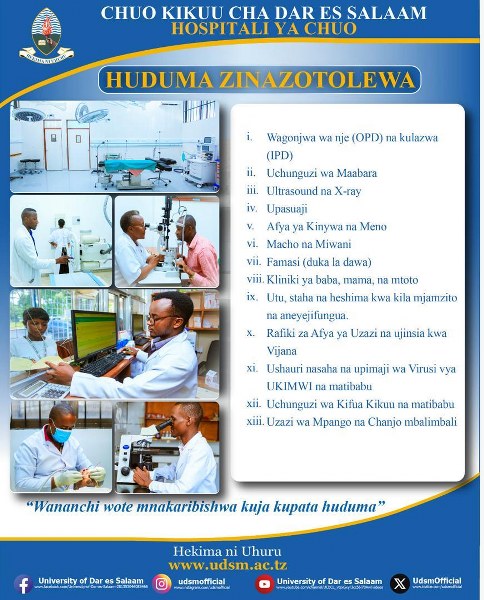Services

Services offered at the UDSM Hospital
The hospital operates 24 hours a day, providing the following services:
- Emergency Services
- General and Specialized Clinics
- Inpatient Care
- General Surgical Services
- Diagnostic Services (Radiology & Laboratory)
- Dental and Oral Health Services
- Eye and Optical Services
- Care and Treatment for People Living with HIV/AIDS
- Reproductive and Child Health Clinics
- Maternity Services
- Pharmacy Services
The hospital is accredited to serve beneficiaries of the National Health Insurance Fund (NHIF). Students are required to enroll in NHIF by completing a registration form and making a prescribed contribution. Once registered, students will receive NHIF membership cards, allowing them to access healthcare services at this hospital and other accredited facilities nationwide.
Students who fall ill before or during exams should promptly notify the appropriate authorities in their respective departments and seek treatment at the UDSM Hospital for further instructions. Requests for exam or study deferrals must be supported by an official medical report from recognized hospitals, which will be reviewed by the Medical Officer in charge at the UDSM Hospital.
HIV and AIDS remain significant global public health challenges, particularly affecting individuals aged 15 to 49. Current data shows that over 40% of new HIV infections occur among youth aged 19 to 24. Preventive measures include abstaining from sex, maintaining monogamous relationships with uninfected partners, consistent and correct use of condoms, avoiding substance abuse that may impair judgment, not sharing needles, and circumcision for males.
Non-communicable diseases (NCDs) such as diabetes, cardiovascular diseases, cancer, chronic respiratory conditions, and depression have also placed a heavy burden on the community, leading to a loss of productivity, poor performance, and increased healthcare costs. Contributing factors include unhealthy diets, physical inactivity, stress, excessive alcohol consumption, and smoking. Regular screening and adopting healthy lifestyle practices can significantly reduce the risk of developing NCDs.
"Remember, a healthy mind thrives in a healthy body."

